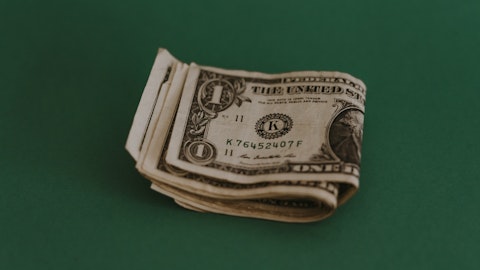Robert Ladd: It would be we’ve had a little bit of an increase in 2023, where we’ve had some restructuring who’s worked on, so I don’t think we expect it to materially change and, in 2024, we have noted in the past that when we’re the only lender or just a small group of lenders and you have a company that might be struggling making their interest coverage, which most of ours, substantial of ours can. But if you have that case, we have the flexibility as a lender to provide some PIK interest, ultimately, it will collect it but this can help the cash flow. So but don’t expect that to materially change in 2024.
Erik Zwick: Thanks for taking my questions today.
Robert Ladd: Thank you.
Operator: Your next question for today from Christopher Nolan with Ladenburg Thalmann.
Christopher Nolan: Hey, guys.
Robert Ladd: Hi, Christopher.
Christopher Nolan: Rob, on your comments in terms of flowing deal activity, I presume that simply, because the private equity partners you work with are just seen slower in investment activity as well. Is that a correlation?
Robert Ladd: That’s correct. It’s highly correlated. I’d say its M&A activity is down and, I think, you may have heard that from others as well. So that’s the most impact for sure.
Christopher Nolan: And then, I guess, in terms of the reinvestments, do the private equity firms have a drag along clause for you guys where if they reinvest into a portfolio company, you need to invest as well or how does that work?
Robert Ladd: Yeah, Chris, do you mean when they’re making a new acquisition?
Christopher Nolan: Follow-on acquisition to an existing portfolio company.
Robert Ladd: Sure. So in many cases, we’ll have already established a delayed draw term loan that they would automatically draw upon if the acquisition follow-on qualified. So this would be normal. Absent that where there’s not a preexisting commitment, any new acquisition they’d make, we’d have to re-underwrite.
Christopher Nolan: Got you. And then, I guess the final question is, last year you had some pretty good dividend supplements. What’s these spillover income? And what are your thoughts about supplements these days?
Robert Ladd: Sure. Let me turn it over to Todd for that.
Todd Huskinson: Sure, Chris. So our spillover is going to be about $37 million and our current dividends are $38.5 million. So at our current dividend level with the additional shares that we raised or issued, we’ve got enough regular dividend to cover the spillover going forward. But things could change in terms of gains and losses and taxable income in future years.
Christopher Nolan: Got it. Okay. Thank you for the detail. That’s it for me. Thanks, guys.
Todd Huskinson: Thank you, Chris.
Robert Ladd: Thank you, Chris.
Operator: Your next question is from Robert Dodd with Raymond James.
Robert Dodd: Hi, guys. On the…
Robert Ladd: Hi, Rob.
Robert Dodd: You mentioned there’s going to be potentially realizations in the second quarter and maybe equity realizations in realized gain, and maybe more activity in the second half of the year. I mean, everything we’re hearing is private equity or LPs in private equity funds want realizations, the full-fledged [ph] fund, new funds. If there are more realizations from your private equity partners in private equity environment as a whole, would you expect – or are there going to be more equity realizations in the back half of the year? Could we accelerate that as a source of capital to be reinvested as we get later into this year?
Robert Ladd: Yes, Robert, and that’s a good point that you brought out that I alluded to which is LPs and longer dated funds looking for realization. So we think this will drive new activity for us as these companies are sold and we have the chance to finance it for the next owner. But as you’re pointing out would also result in realizations for us. So, yes, and as I said in my remarks that we do think that the equity realizations activity will pick up and that there are a few more that we know of that that I didn’t mention, but not as clear as the two that we’re hearing about. So, I think, that’s right. And, again, we have substantial capital to invest as a reminder our entire platform is roughly $2.8 billion of AUM across the Stellus platform so.
And then within the public company, of course, quite a bit of capacity to invest given that our credit facility were only barred at about $150 million currently. So, again, that couple was repayments. So we’ll be ready for the new deals that’ll come to second half of the year.
Robert Dodd: Got it. Thank you. Any particular industries that you’re thinking are increasingly attractive, in this – if we’ve got highlights right now, but if they are going to decline, are there any particular areas you think are appealing in that kind of environment?
Robert Ladd: It’s interesting. We haven’t thought of it in those terms. We were looking for a handful of basic kind of requirements in companies we look at, which start with substantial free cash flow generation as well as growth that’s built into the company. We avoid commodity price risk. We avoid high maintenance CapEx. So we really look more at those factors versus anyone industry sector per se, if that’s helpful. And as you’ve heard me say before, we also look at companies and industry sectors that there’s some history of how they perform in a recession. And this is helpful in terms of resiliency, if you have such a downturn. So, again, I think we’ve approached it more that way versus specific industry sectors.
Robert Dodd: I appreciate that. Thank you.
Robert Ladd: Thank you, Robert.
Operator: Your next question is from Bryce Rowe with B. Riley.
Bryce Rowe: Thanks. Good afternoon.
Robert Ladd: Good afternoon, Bryce.
Bryce Rowe: Hey, Rob. I wanted to start with the NAV movement quarter-over-quarter, obviously, you covered the dividend and saw the NAV go up here over the quarter. Can you speak to maybe the marks within the quarter? What kind of effect did broader credit markets have on the fair value marks in the quarter? And then, were there any kind of specific call outs beyond the non-accruals that we’ve already talked about?
Robert Ladd: Yeah, please, I’ll just turn it over to Todd.





